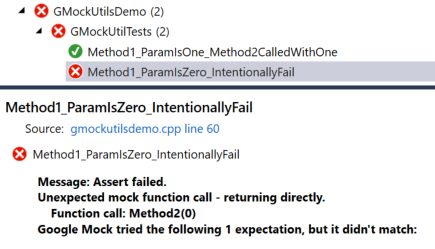I was able to get GMock working correctly with the CppUnitTestFramework by creating a custom TestEventListener. I then created a simple set of interface functions to make it easier to work with.
I used the gmock 1.7.0 NuGet package to install the GMock framework into my project, and added the two files shown below.
GMockUtils.h
#pragma once
#include <CppUnitTest.h>
#include <gmock/gmock.h>
namespace testing {
namespace GMockUtils {
// Call once per test class or module to set up everything needed by GoogleMock.
void InitGoogleMock();
// Call once per test method to check for GoogleMock messages.
void CheckGoogleMock();
}
}
GMockUtils.cpp
#include "stdafx.h"
#include "GMockUtils.h"
using namespace Microsoft::VisualStudio::CppUnitTestFramework;
namespace testing {
namespace GMockUtils {
namespace {
// Test event listener for use with CppUnitTestFramework
class CppUnitTestReporter : public EmptyTestEventListener
{
public:
CppUnitTestReporter() : _failed(false)
{
}
// Helper for converting std::string to std::wstring
std::wstring to_wstring(const std::string& str) const
{
std::wstring output;
std::copy(str.begin(), str.end(), std::back_inserter(output));
return output;
}
// Called after a failed assertion or a SUCCEED() invocation.
void OnTestPartResult(const ::testing::TestPartResult& result) override
{
// Log this result to the CppUnitTestFramework output
Logger::WriteMessage(result.summary());
// Note: You cannot do an Assert directly from a listener, so we
// just store the messages until CheckGoogleMock() is called.
if (result.failed())
{
_failed = true;
// Append this result to the running summary
_failedSummary += result.message();
_failedSummary += "\n";
}
}
// Clear any previous failures
void ResetFailures()
{
_failed = false;
_failedSummary.clear();
}
// Assert if any failures have been detected. Also resets failures.
void CheckFailures()
{
auto failed = _failed;
auto failedSummary = _failedSummary;
ResetFailures();
Assert::IsFalse(failed, to_wstring(failedSummary).c_str());
}
protected:
bool _failed;
std::string _failedSummary;
} *_listener;
}
// Initialize the Google Mock framework for use with CppUnitTestFramework
void InitGoogleMock()
{
// Avoids calling the function unnecessarily
if (_listener != nullptr)
return;
// Dummy command line parameters (could pass exe path here)
int argc = 0;
char** argv = nullptr;
// Initialize the framework
::testing::InitGoogleMock(&argc, argv);
// We don't want exceptions thrown, regardless what the doc says
GTEST_FLAG(throw_on_failure) = false;
// Remove default listener
auto &listeners = UnitTest::GetInstance()->listeners();
delete listeners.Release(listeners.default_result_printer());
// Create and install the new listener
_listener = new CppUnitTestReporter();
listeners.Append(_listener);
}
// Reset any previous failures detected by the listener
void ResetGoogleMock()
{
_listener->ResetFailures();
}
// Prints messages and asserts if any Google Mock messages are found.
void CheckGoogleMock()
{
Assert::IsNotNull(_listener, L"Google Mock framework not initialized by InitGoogleMock()");
_listener->CheckFailures();
}
}
}
I use the GMockUtils functions in unit test classes like this:
#include "GMockUtils.h"
using namespace Microsoft::VisualStudio::CppUnitTestFramework;
using namespace ::testing;
namespace GMockUtilsDemo
{
TEST_CLASS(GMockUtilTests)
{
public:
TEST_CLASS_INITIALIZE(ClassInitializer)
{
// IMPORTANT: This must be called before any mock object constructors
GMockUtils::InitGoogleMock();
}
TEST_METHOD_CLEANUP(MethodCleanup)
{
// Checks for GoogleMock messages. Asserts if found.
GMockUtils::CheckGoogleMock();
}
TEST_METHOD(Method1_ParamIsOne_Method2CalledWithOne)
{
MockTestClass mockObj;
EXPECT_CALL(mockObj, Method2(1)).Times(1); // Expectation will be met
mockObj.Method1(1);
}
TEST_METHOD(Method1_ParamIsZero_IntentionallyFail)
{
MockTestClass mockObj;
EXPECT_CALL(mockObj, Method2(1)).Times(1); // Expectation will not be met
mockObj.Method1(0);
}
};
}
The Console Output
The console output now shows all GMock messages, and the run does not abort on the first test failure.
[3/27/2019 12:23:46 PM Informational] ------ Run test started ------
[3/27/2019 12:23:46 PM Informational]
Unexpected mock function call - returning directly.
Function call: Method2(0)
Google Mock tried the following 1 expectation, but it didn't match:
c:\...\gmockutilsdemo.cpp(64): EXPECT_CALL(_mockObj, Method2(1))...
Expected arg #0: is equal to 1
Actual: 0
Expected: to be called once
Actual: never called - unsatisfied and active
[3/27/2019 12:23:46 PM Informational] Actual function call count doesn't match EXPECT_CALL(_mockObj, Method2(1))...
Expected: to be called once
Actual: never called - unsatisfied and active
[3/27/2019 12:23:46 PM Informational] ========== Run test finished: 2 run (0:00:00.8631468) ==========
Test Explorer View
If I run the tests via Visual Studio Test Explorer, I can also see all GMock messages related to a particular test. It also works with the VsTest task on Azure DevOps.
![Test Explorer screen snippet]()
Hopefully this will be useful to anyone who finds themselves in the same situation.


